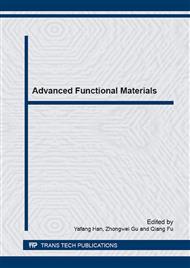[1]
M.J. Green, N. Behabtu, M. Pasquali, W.W. Adams, Nanotubes as polymers, Polymer. 50 (2009) 4979-4997.
DOI: 10.1016/j.polymer.2009.07.044
Google Scholar
[2]
T. Uchida, S. Kumar, Single wall carbon nanotube dispersion and exfoliation in polymers, J. Appl. Polym. Sci. 98 (2005) 985-989.
DOI: 10.1002/app.22203
Google Scholar
[3]
W. Yuan, W.F. Li, Y.G. Mu, M.B.C. Park, Effect of side-chain structure of rigid polyimide dispersant on mechanical properties of single-walled carbon nanotube/cyanate ester composite, ACS Appl. Mater. Interfaces. 3 (2011) 1702-1712.
DOI: 10.1021/am2002229
Google Scholar
[4]
J. Zhu, J. Kim, H. Peng, J.L. Margrave, V.N. Khabashesku, E.V. Barrera, Improving the dispersion and integration of single-walled carbon nanotubes in epoxy composites through functionalization, Nano Lett. 3 (2003) 1107-1113.
DOI: 10.1021/nl0342489
Google Scholar
[5]
M.X. Pulikkathara, O.V. Kuznetsov, V.N. Khabashesku, Sidewall covalent functionalization of single wall carbon nanotubes through reactions of fluoronanotubes with urea, guanidine, and thiourea, Chem. Mater. 20 (2008) 2685-2695.
DOI: 10.1021/cm7035037
Google Scholar
[6]
C.H. Tseng, C.C. Wang, C.Y. Chen, Functionalizing carbon nanotubes by plasma modification for the preparation of covalent-integrated epoxy composites, Chem. Mater. 19 (2007) 308-315.
DOI: 10.1021/cm062277p
Google Scholar
[7]
Q.L. Liu, M. Li, Z.Z. Wang, Y.Z. Gu, Y.X. Li, Z.G. Zhang, Improvement on the tensile performance of buckypaper using a novel dispersant and functionalized carbon nanotubes, Composites Part A. 55 (2013) 102-109.
DOI: 10.1016/j.compositesa.2013.08.011
Google Scholar
[8]
A. Satti, A. Perret, J.E. McCarthy, Y.K. Gun'ko, Covalent crosslinking of single-walled carbon nanotubes with poly(allylamine) to produce mechanically robust composites, J. Mater. Chem. 20 (2010) 7941-7943.
DOI: 10.1039/c0jm01515f
Google Scholar
[9]
J. Boge, L.J. Sweetman, M. Panhuis, S.F. Ralph, The effect of preparation conditions and biopolymer dispersants on the properties of SWNT buckypapers, J. Mater. Chem. 19 (2009) 9131-9140.
DOI: 10.1039/b914824h
Google Scholar
[10]
A. Aldalbahi, M. Panhuis, Electrical and mechanical characteristics of buckypapers and evaporative cast films prepared using single and multi-walled carbon nanotubes and the biopolymer carrageenan, Carbon. 50 (2012) 1197-1208.
DOI: 10.1016/j.carbon.2011.10.034
Google Scholar
[11]
M.Y. Hua, H.C. Chen, R.Y. Tsai, S.J. Tseng, S.C. Hu, C.D. Chiang, P.J. Chang, Preparation of polybenzimidazole-carboxylated multiwalled carbon nanotube composite for intrinsic sensing of hydrogen peroxide, J. Phys. Chem. C. 115 (2011).
DOI: 10.1021/jp202262e
Google Scholar
[12]
Y. Wang, Z.X. Shi, J.H. Fang, H.J. Xu, J. Yin, Graphene oxide/polybenzimidazole composites fabricated by a solvent-exchange method, Carbon. 49 (2011) 1199-1207.
DOI: 10.1016/j.carbon.2010.11.036
Google Scholar
[13]
Y. Wang, J.R. Yu, L. Chen, Z.M. Hu, Z.X. Shi, Nacre-like graphene paper reinforced by polybenzimidazole, J. Zhu: RSC Adv. 3 ( 2013) 20353-20362.
DOI: 10.1039/c3ra43872d
Google Scholar
[14]
A.A. D'Archivio, L. Galantini, A. Biffis, K. Jeǐábek, B. Corain, Polybenzimidazole as a promising support for metal catalysis: morphology and molecular accessibility in the dry and swollen state, Chem. Eur. J. 6 (2000) 794-799.
DOI: 10.1002/(sici)1521-3765(20000303)6:5<794::aid-chem794>3.0.co;2-x
Google Scholar
[15]
B.K. Balan, V.S. Kale, P.P. Aher, M.V. Shelke, V.K. Pillai, S. Kurungot, High aspect ratio nanoscale multifunctional materials derived from hollow carbon nanofiber by polymer insertion and metal decoration, Chem. Commun. 46 (2010) 5590-5592.
DOI: 10.1039/c0cc00571a
Google Scholar
[16]
B.K. Balan, H.D. Chaudhari, U.K. Kharul, S. Kurungot, Carbon nanofiber-RuO2-poly(benzimidazole) ternary hybrids for improved supercapacitor performance, RSC Adv. 3 (2013) 2428-2436.
DOI: 10.1039/c2ra22776b
Google Scholar
[17]
M. Lv, S. Su, Y. He, Q. Huang, W.B. Hu, D. Li, C.H. Fan, S.T. Lee, Long-term antimicrobial effect of silicon nanowires decorated with silver nanoparticles, Adv. Mater. 22 (2010) 5463-5467.
DOI: 10.1002/adma.201001934
Google Scholar
[18]
S. Wunder, F. Polzer, Y. Lu, Y. Mei, M. Ballauff, Kinetic analysis of catalytic reduction of 4-nitrophenol by metallic nanoparticles immobilized in spherical polyelectrolyte brushes, J. Phys. Chem. C. 114 (2010) 8814-8820.
DOI: 10.1021/jp101125j
Google Scholar
[19]
S. Montree, S. Montakan, K. Kawita, K. Jakkrit, S. Pattarachai, S. Yanisa, K. Panupong, S. Phansiri, C. Poramane, High-performance supercapacitors based on silver nanoparticle-polyaniline-graphene nanocomposites coated on flexible carbon fiber paper, J. Mater. Chem. A. 1 (2013).
DOI: 10.1039/c3ta12194a
Google Scholar
[20]
W. Yuan, J. Che, M.B.C. Park, A novel polyimide dispersing matrix for highly electically conductive solution-cast carbon nanotube-based composit, Chem. Mater. 23 (2011) 4149-4157.
DOI: 10.1021/cm200909x
Google Scholar
[21]
S. Hsieh, P.Y. Lin, L.Y. Chu, Improved performance of solution-phase surface-enhanced raman scattering at Ag/CuO nanocomposite surfaces, J. Phys. Chem. C. 118 (2014) 12500-12505.
DOI: 10.1021/jp503202f
Google Scholar
[22]
M. Montazer, A. Shamei, F. Alimonhammadi, Synthesis of nanosilver on polyamide fabric using silver/ammonia complex, Mater. Sci. Eng., C. 38 (2014) 170-176.
DOI: 10.1016/j.msec.2014.01.044
Google Scholar
[23]
S.K. Li, Y.X. Yan, J.L. Wang, S.H. Yu, Bio-inspired in situ growth of monolayer silver nanoparticles on graphene oxide paper as multifunctional substrate, Nanoscale. (5) 2013 12616-12623.
DOI: 10.1039/c3nr03857b
Google Scholar
[24]
K. Shrivas, H.F. Wu, Modified silver nanoparticle as a hydrophobic affinity probe for analysis of peptides and proteins in biological samples by using liquid-liquid microextraction coupled to ap-maldi-ion trap and maldi-tof mass spectrometry, Anal. Chem. 80 (2008).
DOI: 10.1021/ac702309w
Google Scholar
[25]
S.Y. Lee, M.H. Lee, Y.K. Park, S.S. You, Modeling for ligand-capped metallic nanoparticles in a gas-expanded liquids system: Surface fraction model, Ind. Eng. Chem. Res. 52 (2013) 1705-1715.
DOI: 10.1021/ie300816t
Google Scholar


